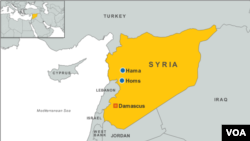The leader of Lebanon's powerful Hezbollah militant group has appealed for calm after protests erupted in Beirut following the kidnapping of at least 11 Lebanese Shi'ites near the Syrian city of Aleppo as they returned home from a pilgrimage.
Tuesday's abductions are the latest spillover of the neighboring Syrian conflict to sow unrest in Lebanon.
Lebanese security officials and eyewitnesses confirmed the kidnapping, but it was not immediately clear who had seized the group or exactly how many people were abducted.
The Hezbollah leadership and family members described the men as religious pilgrims transiting Syria by bus on their way back from visiting holy Shi'ite shrines in Iraq.
Lebanese media reports said members of the rebel Free Syrian Army kidnapped 13 men, while the Syrian news agency reported that 11 Lebanese and a Syrian driver were seized by "an armed terrorist group." The women were released.
Members of the Free Syrian Army denied the group was responsible.
As news of the kidnapping spread, residents of Beirut's southern suburbs - a Shi'ite area - briefly took to the streets, burning tires and blocking roads in protest. The Hezbollah leader, Sheikh Hassan Nasrallah, later urged restraint in an address broadcast by Lebanese television stations, saying contacts with Syrian authorities were under way for a quick resolution.
Meanwhile, activists said Syrian security forces attacked the town of Azaz - in Aleppo province, where the abductions took place - within hours of the kidnapping.
Earlier, the British-based Syrian Observatory for Human Rights said a bomb attack at a Damascus restaurant killed five people Tuesday. The group said the blast targeted the Qaboun neighborhood, which has been the center of several protests against President Bashar al-Assad.
Also Tuesday, Lebanese authorities released on $330 bail an outspoken anti-Assad Sunni Muslim cleric whose arrest earlier this month sparked deadly unrest in a region of northern Lebanon that backs the revolt against the Syrian leader.
Shadi al-Moulawi's detention ushered in several days of clashes between Sunni Islamist foes of Mr. Assad and the Lebanese army and pro-Assad Alawites, killing eight people.
Those battles moved to the capital after the Lebanese army killed two people, one of them a prominent anti-Assad cleric, in northern Lebanon on Sunday.
A raucous funeral for Sheikh Ahmed Abdul-Wahid was held on Monday. The Lebanese military says it is investigating his shooting..
Tuesday's abductions are the latest spillover of the neighboring Syrian conflict to sow unrest in Lebanon.
Lebanese security officials and eyewitnesses confirmed the kidnapping, but it was not immediately clear who had seized the group or exactly how many people were abducted.
The Hezbollah leadership and family members described the men as religious pilgrims transiting Syria by bus on their way back from visiting holy Shi'ite shrines in Iraq.
Lebanese media reports said members of the rebel Free Syrian Army kidnapped 13 men, while the Syrian news agency reported that 11 Lebanese and a Syrian driver were seized by "an armed terrorist group." The women were released.
Members of the Free Syrian Army denied the group was responsible.
As news of the kidnapping spread, residents of Beirut's southern suburbs - a Shi'ite area - briefly took to the streets, burning tires and blocking roads in protest. The Hezbollah leader, Sheikh Hassan Nasrallah, later urged restraint in an address broadcast by Lebanese television stations, saying contacts with Syrian authorities were under way for a quick resolution.
Meanwhile, activists said Syrian security forces attacked the town of Azaz - in Aleppo province, where the abductions took place - within hours of the kidnapping.
Earlier, the British-based Syrian Observatory for Human Rights said a bomb attack at a Damascus restaurant killed five people Tuesday. The group said the blast targeted the Qaboun neighborhood, which has been the center of several protests against President Bashar al-Assad.
Also Tuesday, Lebanese authorities released on $330 bail an outspoken anti-Assad Sunni Muslim cleric whose arrest earlier this month sparked deadly unrest in a region of northern Lebanon that backs the revolt against the Syrian leader.
Shadi al-Moulawi's detention ushered in several days of clashes between Sunni Islamist foes of Mr. Assad and the Lebanese army and pro-Assad Alawites, killing eight people.
Those battles moved to the capital after the Lebanese army killed two people, one of them a prominent anti-Assad cleric, in northern Lebanon on Sunday.
A raucous funeral for Sheikh Ahmed Abdul-Wahid was held on Monday. The Lebanese military says it is investigating his shooting..
Some information for this report was provided by AFP and Reuters.





